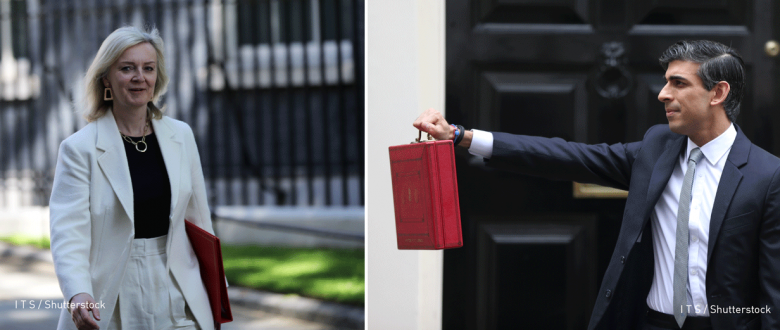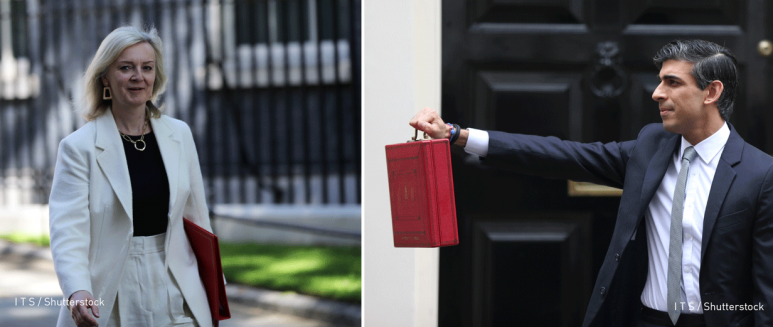By Hannah Ajala
With the recent breaking news of the current UK Prime Minister Boris Johnson announcing his resignation, the search is on the way for a new leader of the Conservative party, and eventually a leader of the country.
News headlines filled the UK public with updates of the hundreds of fellow conservative members who casted their personal votes in the hopes to replace Johnson as Prime Minister.

At the start of the ongoing voting rounds, the country watched final candidates for the British Conservative Party leadership and the online discussions as well as on foreign media focused highly on their identity. Numerous online conversations and tweets have suggested the selection of the next prime minister could be ‘historic’ considering that two out of the final five happen to be Rishi Sunak – from an Asian background – and Kemi Badenoch – from a Black African background.
For the first time in history, Britons could soon have a person of color as their prime minister. Even more, that person could also be a woman.
What it’s least likely to be: a white man.https://t.co/xUii7uxzxs
— Jaweed Kaleem (@jaweedkaleem) July 18, 2022
Eventually only two remained for the final race: Rishi Sunak and Liz Truss.
The idea of representations goes way more beyond than the physical look and gender of a candidate. When it comes to leadership over a country like the UK, which needs more stability now than ever, there seems to be a lack of knowledge- and rather replacing it with identity politics to feel represented, rather than actually feeling included as a citizen of that country.
MDI reached out to Rae Dosoo, a British politics blogger and enthusiast. Rae starts by immediately highlighting the positive impact of the diversity of MPs. She describes seeing different people from different walks of life and backgrounds in the political field as ‘amazing’:
There is a strong lack in diversity of thought; it’s not being pushed in the political agenda of the country and therefore doesn’t excite her. She goes onto say that MPs from diverse backgrounds are not in any way using their own personal life experiences to help push agendas to communities similarly to their own, or for their people in parliament. It’s like they’re being pushed into one side of thinking.
‘It could be that they are afraid to speak their mind. It’s very boring. We need diversity!’ she goes on to say,’ she tells Media Diversity Institute.
‘I would describe the portrayal and media representation of diverse MPs – as terrible. The way I’ve seen the media treat MPs like Dawn Butler and Diane Abbott, both have who have been subjected to racism throughout their jobs. They continue to be painted in a bad light, even though what they speak and argue about are important issues. They are often tarnished and described as ‘too outspoken’, and ‘unintelligent’, whereas their counterparts who are often white, are not described that way,’ says Dosoo.
An Afghan refugee who asked for sanctuary in the UK, whose father sacrificed his life as an interpreter for British troops in Helmand province- one of those Priti Patel wanted to deport to Rwanda.
Tory immigration policy is institutionally racist.
— Howard Beckett (@BeckettUnite) June 16, 2022
‘I think it’s not only the media’s fault though, many of these political parties need to speak up for these women from Black and minority ethnic groups. The women who refuse to pipe down and stick up for their beliefs are often bullied by the media and social media. The only hope I have is to see the political parties standing up for their women,’ Dosoo continues.
Several news headlines have revealed the harrowing experiences MPs from a Black and Asian background face, which can essentially group the role of British politics and British media – how exactly are they conveying the portrayal of those from a Black and minority ethnic group?
After seeing campaign speeches, media appearances and videos by figures like Kemi Badenoch, and Rishi Sunak, it came with a variation of responses.
Dosoo describes her own as ‘hilarious‘: ‘It’s great seeing Kemi in particular, an intelligent and ambitious woman, a Black woman, going forward for this role. However, I do not agree with her politics, when she compared the U.K. to Nigeria, her belief that working hard means you will do well. That’s not always the truth as I’ve found that disregards the issues in the UK by whitewashing them.’
‘I also sometimes feel unsure about what she stands for, and what she’s fighting for. Her speech didn’t motivate or inspire me. As for Rishi Sunak, I think out of all of the Tory candidates, he appears as an ‘ideal Prime Minister’ due to his slight charisma. People appreciate Rishi for some of the policies he implemented for British citizens, especially during the pandemic. I think his wealth and how unrelatable he is to the working class might set him back a bit,’ says Dosoo.
And when looking into ways on how diversity and British politics can work hand in hand, Rae focuses on the importance of uplifting marginalised communities instead:
‘Both will be able to work hand in hand together when Black and Asian politicians aren’t second-guessed or looked at differently by their counterparts. They should be able to speak their mind without fearing repercussions, and need to be protected more. The irony also is that a lot of the front runners and key politicians from diverse backgrounds happen to be in one of the least historically diverse political British party.
Every political party in the UK, Labour, SNP, etc. should follow suit and motivate Black and Asian politicians to go for bigger positions.’
Allyship as a whole needs to be practiced across all institutions – as it will support those from minority backgrounds to have a better chance, strengthen representation in non-diverse environments, and work towards becoming an inspirational example of future politicians to come.
Photo Credits: I T S / Shutterstock

